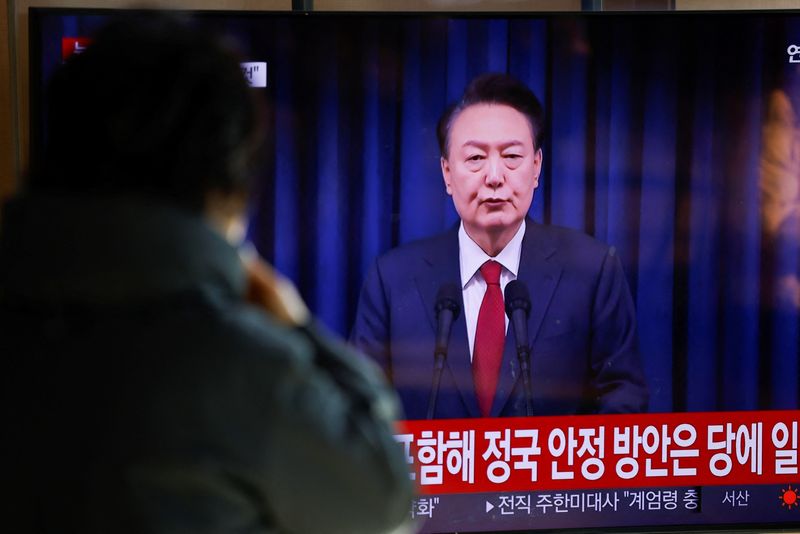By Hyonhee Shin
SEOUL (Reuters) – South Korean President Yoon Suk Yeol, several Cabinet ministers, military commanders and police officials are facing criminal investigation over the president’s botched attempt on December 3 to impose martial law.
Prosecutors, police and the Senior Officials Corruption Investigation Bureau have all launched investigations into Yoon and the officials to investigate allegations of insurrection and abuse of power, among other things.
Here’s what we know about the investigation so far:
Who is being investigated?
In addition to Yoon, his former defense minister Kim Yong-hyun, former interior minister Lee Sang-min and army chief Park An-su, who was appointed martial law commander, are also facing investigations.
Others involved in the case include the heads of the Capital Defense Command, the Army’s Special Warfare Command and the Defense Counterintelligence Command, as well as several other military generals and senior police officials, including the country’s and Seoul’s police chiefs, who are accused of playing a role in the martial law plan.
The main opposition Democratic Party said last week that it had also filed a complaint against incumbent President Han Duck-soo to be included in the investigation for failing to block Yoon’s attempt to declare martial law.
Yoon, Kim, Lee, the national and Seoul police chiefs and more than ten military commanders were banned from leaving the country.
A joint investigation team from the police, defense ministry and the Corruption Investigation Office for High-ranking Officials (CIO) plans to summon Yoon for questioning at 10 a.m. (0100 GMT) on Wednesday after he defied prosecutors’ summons over the weekend.
According to Yonhap News Agency, Kim refused to participate in questioning by prosecutors after being summoned at least three times since his arrest on December 8.
The joint investigation team attempted to search Yoon’s office on Tuesday after earlier attempts by prosecutors failed after the presidential security service blocked their entrance, Yonhap said.
There have also been raids in the Ministry of Defense and various military and police offices in recent days. Several military commanders were arrested, including heads of the Army, Defense Counterintelligence Command and Capital Defense Command.
WHO LEADS THE INVESTIGATION?
The Supreme Prosecutor’s Office has set up a special investigation office to investigate the case for the first time since investigating a 2016 corruption scandal involving then-President Park Geun-hye, who was impeached and eventually ousted.
The team consists of around 50 prosecutors and investigators, and around a dozen military prosecutors have also been drafted in, said its head Park Se-hyun.
The national police agency has also confirmed the start of its investigation, which Yonhap said involves about 150 officers and investigators.
The CIO separately launched an investigation after receiving complaints against national police chief Cho Ji-ho and other senior police officers.
The creation of the three-member team came amid growing concerns about signs of rivalry between investigative agencies and calls for concerted efforts to prevent duplication and increase effectiveness.
CIO chief Oh Dong-woon said on Wednesday that discussions were underway with prosecutors about how to integrate their work, but a quick conclusion appeared unlikely.
Parliament last week passed draft legislation to appoint special investigators to lead a collective investigation with support from other authorities.
What fees are charged?
The officials may be charged with rioting, abuse of power and obstructing the exercise of their rights.
If convicted, the crime of leading an insurrection is punishable by death or life imprisonment, with or without prison labor. For those who participated in an insurrection or engaged in other significant activities, punishment could range from the death penalty to life imprisonment to imprisonment without prison labor for at least five years. People who merely participated in the conspiracy or violence face a prison sentence of less than five years, with or without prison labor.

Abuse of office is punishable by a prison sentence of less than five years or a fine of up to 10 million won (US$7,000), while obstructing the rights of other people is punishable by a prison sentence of less than five years or a fine of up to 7 million Where will be punished.
South Korea last imposed a death sentence in 2016 but has not executed anyone since 1997.





